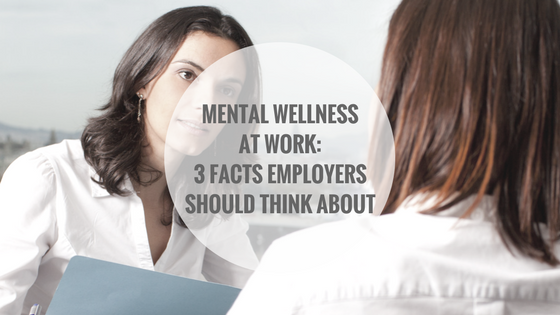Julie Entwistle, MBA, BHSc (OT), BSc (Health / Gerontology)
“There is no health without mental health.” –World Health Organization
This quote from the World Health Organization really drives home the importance of a holistic health approach. When it comes to health and safety in the workplace, we are often quick to think of work-related musculoskeletal disorders and other physical injuries, but just as with health in general, we also need to make mental health in the workplace a priority. Psychological health in relation to work is comprised of the ability to think, feel, and behave in a manner that allows employees to perform effectively in work environments, as well as in their personal lives and society at large. As an employer, here are some starting points to consider to help you promote mental wellness in your work environment.
Learn to recognize potential or existing problems: Stress is often thought to be a typical part of any job. However, excessive stress can lead to mental health problems. Take a critical look at your work environment. Do your employees face high demands? Excessive pressure? Do they have low control or say in how things are done? These can create unhealthy work conditions that lead to increased levels of work-related stress, which can lead to increased risk for mental illness.
Talk about mental health: People who experience mental health issues often face stigma, shame and misunderstanding. Often times, employees who are experiencing mental health challenges are fearful to approach their employer and thus keep their issues private. Whether you are already aware of employees dealing with mental illness or not, voicing your support for mental wellness at work helps to foster a trusting and open environment. This can make all employees feel more comfortable to discuss problems, or ask for help. Try posting a sign in the staff room or regularly mention that you support mental wellness. Leading by example sets a strong standard and helps develop a healthy work culture of acceptance.
Know your responsibilities: Do you know the signs and symptoms of common mental health issues such as depression or anxiety? Do you understand how these conditions impact an employee’s performance on the job? Are you aware of your legal responsibilities to your employees dealing with mental illness such as accommodations? Do you know what resources are available to you and your employees to support mental health at work? You need to be aware of all these factors to be able to promote and support mental wellness.
An ounce of prevention: Implementing preventative measures in relation to mental wellbeing at work can be achieved in a variety of ways and when done well, these can have a significant impact on improving productivity, reducing absenteeism, presenteeism, and employee turnover and associated costs. Look at creating a workplace wellness program that addresses all aspects of your employees’ well-being, especially mental health. Show your employees that you value their health and make this a standard component of your business decisions. Mental wellness also needs to be reflected in workplace policies and procedures and show that employee wellbeing is a core value of your organization.
Occupational therapists’ knowledge and skill set allows them to help employers and organizations with each of the four areas listed above and more. From providing education and training programs, assessing problem areas, supporting communication and developing policies, occupational therapists can provide essential information and assistance to enable you to support mental wellness at work.
Check out more of our healthy workplace posts here.


